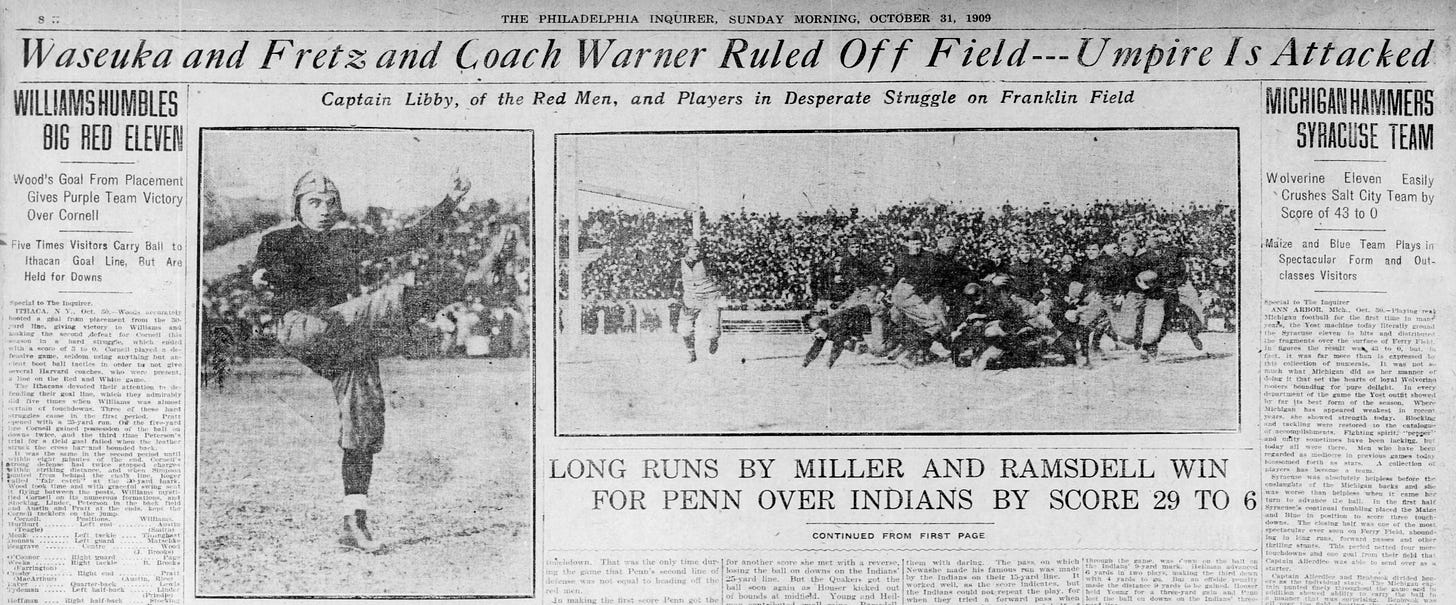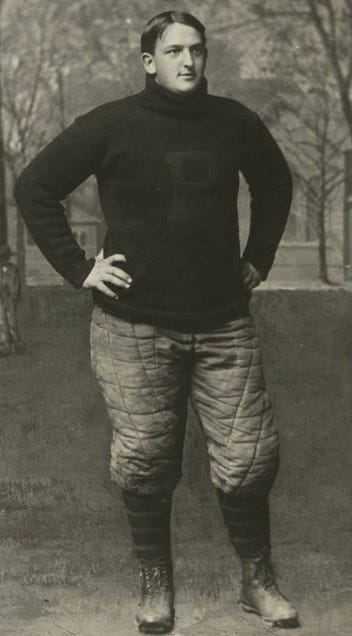Today's Tidbit... The Umpire Strikes Back?

Players, coaches, and crowd members criticizing or attacking the officials at sporting events seem to be getting worse and more frequent, but it certainly is nothing new. Football had seen such incidents since well before the officials wore striped shirts; one of them occurred when Carlisle met Penn at Franklin Field in 1909.
Although Penn won two-thirds of the non-tie games between the teams, Carlisle beat Penn soundly in 1906 and 1907 before tying the 1908 game, so Penn was not in a good mood as the game began. Still, it appeared to be a clean game as the Quakers raced to an early lead at the midpoint of the first half. Penn's quarterback, Miller, then ran around the end and was forcefully knocked out of bound by Carlisle's left tackle, Waseuka. Perhaps he gave Miller a little extra treatment on the play. Either way, Penn's left tackle, Fretz, jumped into the mix to help Miller from the ground. However, Waseuka objected to Fretz's actions, leading to the two exchanging blows.

At that point, the game's umpire and former Princeton star, Big Bill Edwards, entered the fray, upon which Waseuka delivered a blow to Edward's jaw. Edwards promptly tossed Waseuka from the game, leading Carlisle coach Pop Warner to rush onto the field, accusing Edwards and the referee, Walter Okeson, of favoring Penn. Okeson, who, like Edwards, was a leading Eastern official, did not take kindly to the accusations, so he or Edwards also tossed Warner from the game. And for good measure, Fretz of Penn was also instructed to head to the locker room.
Who was in the right, and who was in the wrong? There can be no doubt that Waseuka had to go after striking Edwards, and Waseuka may have been fortunate that Big Bill did not deal with him in other ways. As one columnist noted:
Bill Edwards was a storm centre, and when storms come Bill's way he doesn't run away from them. In this case it appears that he not only showed firmness, but admirable self-control. As a player, Bill probably would have swatted back; as an official he takes the offender by the figurative ear and leads him off the field.
'In The Football World,' Sun (New York), November 1, 1909.
So, Big Bill kept his calm and did not strike back. However, football was a different world back then. It was not uncommon for officials to write newspaper articles about the games they officiated or to provide scouting reports to upcoming opponents. That is what happened here.
Although Carlisle approved of Edwards handling the game, they remained resentful after he officiated their win over Penn in 1907. His game officiating had not been the problem. Instead, they disliked him coaching his alma mater, Princeton, over the next few days on Carlisle's new "open football" plays, helping the Tigers beat Carlisle the following Saturday.
Ultimately, the Quakers went on to beat Carlisle 29-6 on the day of the big fight, but the football community quickly forgot about the incident. On the same day, Eugene Byrne, a senior left tackle for Army, died shortly after collapsing in their game with Harvard. His death and others led to another set of safety-oriented rule changes in 1910. After hearing news of Byrne’s death, punching an umpire no longer seemed like a big deal.
Football Archaeology is reader-supported. Click here to buy one of my books or otherwise support the site.


